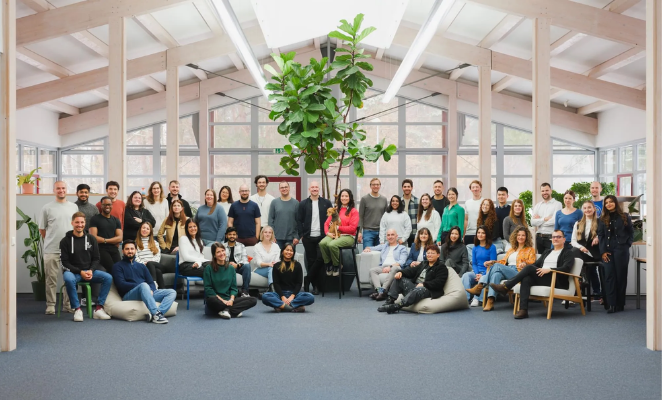Europe's Deep Tech sector just hit a milestone: nearly €15 billion invested in 2024, cementing its position as one of venture capital's hottest sectors. Yet for founders building hardware-first companies, from quantum processors to industrial robotics, the path to funding remains frustratingly opaque.


Europe's Deep Tech sector just hit a milestone: nearly €15 billion invested in 2024, cementing its position as one of venture capital's hottest sectors. Yet for founders building hardware-first companies, from quantum processors to industrial robotics, the path to funding remains frustratingly opaque.
Today, we're releasing the Deep Tech Hardware Napkin 2025, our second annual attempt to democratize knowledge about what it actually takes for Deep Tech hardware startups to raise capital in Europe. Building on last year's groundbreaking research, this year's napkin reveals surprising shifts in how investors evaluate technical risk, team composition, and commercial readiness.
The most striking finding from our 2025 data defies conventional wisdom: European Deep Tech startups are raising large rounds with less mature technology than ever before.
80% of pre-seed companies now sit in the concept or lab demonstration stage, compared to just 60% last year. This represents a fundamental shift in investor risk appetite. VCs are betting earlier and bigger on technical breakthroughs, even when the technology hasn't left the laboratory.
This isn't recklessness; it's recognition. As Dr. Maximilian Ochs, who leads the initiative at First Momentum, put it, "The specific thing about Deep Tech investing is that you mainly take on technical risk, but it gets compensated by less market or commercialization risk." When you're building a quantum computer or a fusion reactor, the technical challenge is immense, but the market demand is guaranteed if you crack the code.
Our data reveals that European Deep Tech has become even more founder-technical than before. In pre-seed rounds, 90% of founders now hold relevant PhDs (up from 81% last year), and 42% have more than five years of industry experience (up from 27%).
Surprisingly, the presence of commercial co-founders has plummeted. Only 26% of pre-seed teams now include a business-focused co-founder, down from 54% last year. This doesn't mean commercial skills matter less; quite the opposite. VCs are explicitly seeking founders with commercial acumen, regardless of their educational background.
The winning formula we're seeing? Either a technical CEO with strong commercial intuition, or a technical founder paired with a business-savvy co-founder. Pure technical brilliance isn't enough; investors want founders who understand not just how to build breakthrough technology, but why someone will pay for it.
Perhaps the most counterintuitive insight: revenue remains secondary, even deep into a company's journey. Only one pre-seed startup in our entire dataset generated revenue, and 30% of Series B companies still have no revenue at all.
This isn't a bug in the Deep Tech model. Unlike SaaS companies that can iterate rapidly toward product-market fit, Deep Tech hardware requires years of R&D before generating meaningful revenue. Smart investors understand this, focusing instead on technical milestones and customer validation signals that indicate long-term commercial viability.
At Series A, only 29% of startups have achieved a repeatable sales motion; a stark contrast to software companies, where revenue metrics typically dominate investment decisions by this stage.
Our survey captured over 100 funding rounds from more than 20 European Deep Tech VCs, spanning everything from semiconductors and quantum computing (27.9% of our dataset) to industrial tech (26%) and energy (18.3%). The diversity reflects Europe's unique strength: a deep reservoir of technical talent emerging from world-class research institutions, combined with industrial applications that create immediate market demand.
This technical depth shows in the data. European Deep Tech founders aren't just technically competent - they're technically exceptional. The challenge isn't finding brilliant engineers; it's helping them navigate the complex journey from laboratory breakthrough to scalable business.
The trends we're documenting signal a maturing European Deep Tech ecosystem. Investors are becoming more comfortable with technical risk, founders are becoming more commercially sophisticated, and the feedback loop between research institutions and venture capital is accelerating.
But challenges remain. The extended development timelines inherent to Deep Tech require patient capital and sophisticated investors who understand that the biggest breakthroughs can't be rushed. The 30% of Series B companies without revenue aren't failing; they're following the Deep Tech playbook, where technical de-risking often precedes commercial validation.
As we prepare for next year's napkin, several trends bear watching. Will the comfort with technical risk continue expanding? How will AI integration change development timelines? And most importantly, as Europe's Deep Tech companies mature, will we see the commercial breakthroughs that justify today's ambitious valuations?
The European Deep Tech sector stands at an inflection point. With nearly €15 billion in annual investment and an increasingly sophisticated investor base, we're witnessing the emergence of a truly differentiated ecosystem. The founders who understand these dynamics, who can blend technical excellence with commercial clarity, will build the next generation of Deep Tech Unicorns Made in Europe.
For founders navigating this landscape, the message is clear: technical brilliance opens doors, but commercial insight closes deals. Master both, and Europe's Deep Tech ecosystem offers unprecedented opportunities to turn laboratory breakthroughs into world-changing companies.
The complete Deep Tech Hardware Napkin 2025, including detailed benchmarks across funding stages, team composition analysis, and commercialization metrics, is available for download here. The research represents insights from over 100 funding rounds across more than 20 European Deep Tech VCs, providing the most comprehensive view of European Deep Tech funding dynamics available today.



